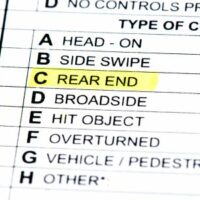The Police Report That Was Written After My Car Accident Is Wrong. What Can I Do?

One of the first crucial things you should do after being involved in a car accident, as long as you are in a position to do so, is to call law enforcers to the accident scene. Once an officer gets to the accident scene, they will prepare a police report. Usually, law enforcement officers will prepare police reports with the help of statements from people who were involved in or witnessed an accident.
The police report written after your accident will contain a lot of information about your crash. It may contain information about the people involved in the accident, witnesses that saw what occurred, a description of the crash, and the position of the vehicles, among many other things. Sometimes, a police report will even mention the party that caused the accident.
Considering everything a police report contains, it is understandable why police reports play a significant role in car accident claims. After you file a personal injury claim against another party, an insurance adjuster will most likely review the police report written after your accident. A police report is generally one of the things that help insurance adjusters make informed decisions.
Suppose you look at the police report pertaining to your case and realize that the report contains wrong information. In such a case, what do you do? You can take several steps if you disagree with the details of the police report written after your accident. Since the police report is crucial to your case, you and your attorney must act fast after realizing the police report is not accurate.
Correcting Factual Mistakes
Correcting a police report that contains factual errors is rather straightforward as long as you and your attorney have evidence to prove the factual error on the police report. If, for example, the police officer got the wrong details about your insurance coverage, you can have the report amended if you provide documentation showing the correct details about your insurance coverage.
Correcting Non-Factual Mistakes
On the other hand, correcting non-factual information can be challenging. In the case of a non-factual error, you most likely don’t have any evidence to prove the error on the police report. For example, you might find that you disagree with an account given by a witness. If that is the case, you will most likely have a difficult time getting any change made to the police report. When faced with such a situation, the best option is for you to write your version of what you are disputing and then request that your report be submitted alongside the police report. Unfortunately, in most cases, whether your additional report gets submitted as evidence is usually up to the law enforcement agency.
Contact Us for Legal Help
If you’ve sustained severe injuries in a Florida car accident, you need to speak to a Florida personal injury attorney. Our Miami personal injury attorneys at the Pendas Law Firm can help you gather the evidence you need to support your claim. We can help you obtain fair compensation that can help you and your family live a comfortable life. Our team of experts can also help you challenge an inaccurate police report and any other inadmissible evidence. Contact us today to schedule a consultation.
The Pendas Law Firm has offices in Tampa, Orlando, Bradenton, Ocala, Jacksonville, Daytona Beach, Fort Myers, Fort Lauderdale, and West Palm Beach areas.
Resource:
forbes.com/advisor/car-insurance/what-to-do-after-accident/






